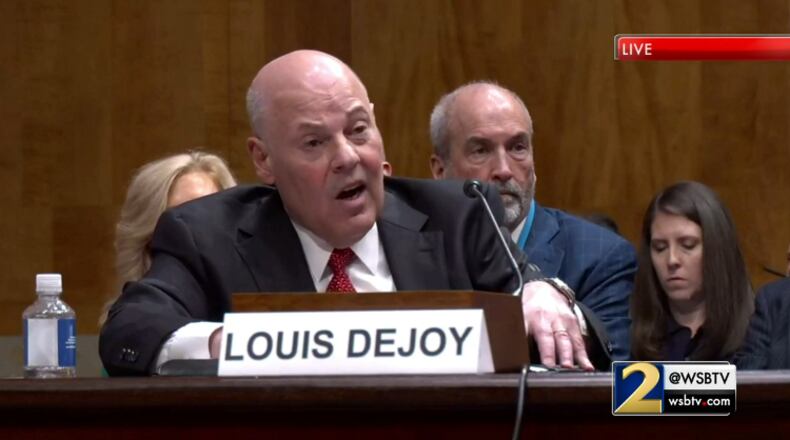A frustrated Jon Ossoff did not hold back Tuesday in his questioning of the postmaster general during a U.S. Senate committee hearing on nationwide postal woes, pressing Louis DeJoy to explain what has led to on-time delivery being met only a fraction of the time in metro Atlanta.
“You’ve got weeks, not months, to fix this,” the Georgia senator said, scolding DeJoy during the nearly two-hour hearing on Capitol Hill.
For weeks, mail has been moving slowly at the Atlanta Regional Processing and Distribution Center in Palmetto. The delays have left customers exasperated, especially those who have had to deal with such problems as their medications not being delivered, their bills not being paid on time and their businesses suffering.
“I have constituents with prescriptions that aren’t being delivered,” Ossoff said. “I’ve got constituents who can’t pay their rent and their mortgages. I’ve got businesses who aren’t able to ship products or receive supplies.”
The Postal Regulatory Commission, which provides transparency and accountability of the USPS, found “alarming” issues with service performance, finances and efficiency, Chairman Michael Kubayanda told the members of the Senate’s Homeland Security and Governmental Affairs Committee. The issues are not only plaguing Georgia, but Virginia and Texas as well.
In the Atlanta area, on-time delivery for first-class mail was being met only 36% of the time, and letters and cards “which should arrive in a generous two-day window, met that standard only 16% of the time in March,” Kubayanda said.
Those findings are especially concerning, he said, with the upcoming election since many voters will cast mail-in ballots.
During his opening remarks, DeJoy told committee members that the ongoing issues stem from outdated infrastructure and processes caused by chronic underfunding.
“I ask that you recognize that our pursuit of long-term viability should have begun over a decade earlier,” he said. The damage caused by the failure to modernize the USPS has “proved self-destructive in a modern American economy,” he explained.
“As a result, the road to success will not be a straight and easy path,” DeJoy added. Rather, he explained, it will be a series of struggles “that won’t be comfortable at times.”
But he touted the successes, too. For example, he said the new Palmetto facility went from processing packages by hand to having the ability to process “a million a night.”
The delays at the same facility, he explained, are a result of having to move 2,000 employees there from other locations, and the postal service has “strict requirements as to when they move,” as well as “inbound transportation issues.”
Senators pushed back, asserting there should have been better preparations to avoid such delays as facilities are upgraded and renovated.
“Do you think that one of your private-sector competitors would have rolled out a new system that would reduce on-time delivery to 36% and then say it’s going to take months to fix it? ... I wrote you on March 14. Did you get my letter?” Ossoff asked DeJoy.
DeJoy said he had not read the senator’s letter, which asked two questions: What update can be provided in the effort to remedy the ongoing postal delays, and how is USPS communicating with customers about delayed or lost packages within metro Atlanta?
“You should personally read letters from members of the U.S. Senate committee that oversees your operations, particularly where you are failing abysmally to fulfill your core mission,” Ossoff said to DeJoy before clarifying that he was not referring to postal workers.
“I think postal workers are out there every single day working their hearts out to deliver the mail on time,” he said. “But if they don’t have the infrastructure and the management ... to make a transition like this without drastically impairing the core function of the Postal Service, everyone in my state is losing.”
The senator then asked what specific steps would be taken to remedy the situation and how long it will take.
DeJoy said they are working to beef up staffing at the sites that saw employee transfers and are streamlining truck schedules. He said customers can expect to see service improvements in about 60 days.
“The team is working, working very hard, and I can assure you that in the long run, you will have the, probably the best service,” he said.
“The long run is too long,” Ossoff said before yielding the rest of his time. “If you don’t fix it — 36% on-time delivery — I don’t think you’re fit for this job.”
DeJoy also said the “two plants in Richmond in Atlanta, and the whole Georgia area, will be the finest running plants of the organization very shortly.”
Sen. Gary Peters, D-Michigan, the chairman of the committee, told DeJoy that he’d like to see more transparency.
“In my letters to the postal service about your plans, I’ve asked for several specific sets of information. And we have not received full answers,” Peters said.
He asked DeJoy to provide three things: information about each location the postal service is planning to change; full-service data on every location that has already been changed; and cost projections the postal service has conducted. Peters asked for the data to be provided by May 1.
Sen. James Lankford, R-Oklahoma, said his state has a number of postal facilities that will soon undergo the same changes and upgrades the Palmetto facility is experiencing, and he wanted to know if there is an expectation that every location will see a decline in delivery time before seeing improvements. DeJoy said he did expect that there will be an initial slowdown, but that he is optimistic that service will improve once upgrades are made.
“We just have to change just about everything we’re doing,” he said, “which is what we’re embarking on. But I think it will be more reliable in terms of our service and flexibility.”
Keep Reading
The Latest
Featured




